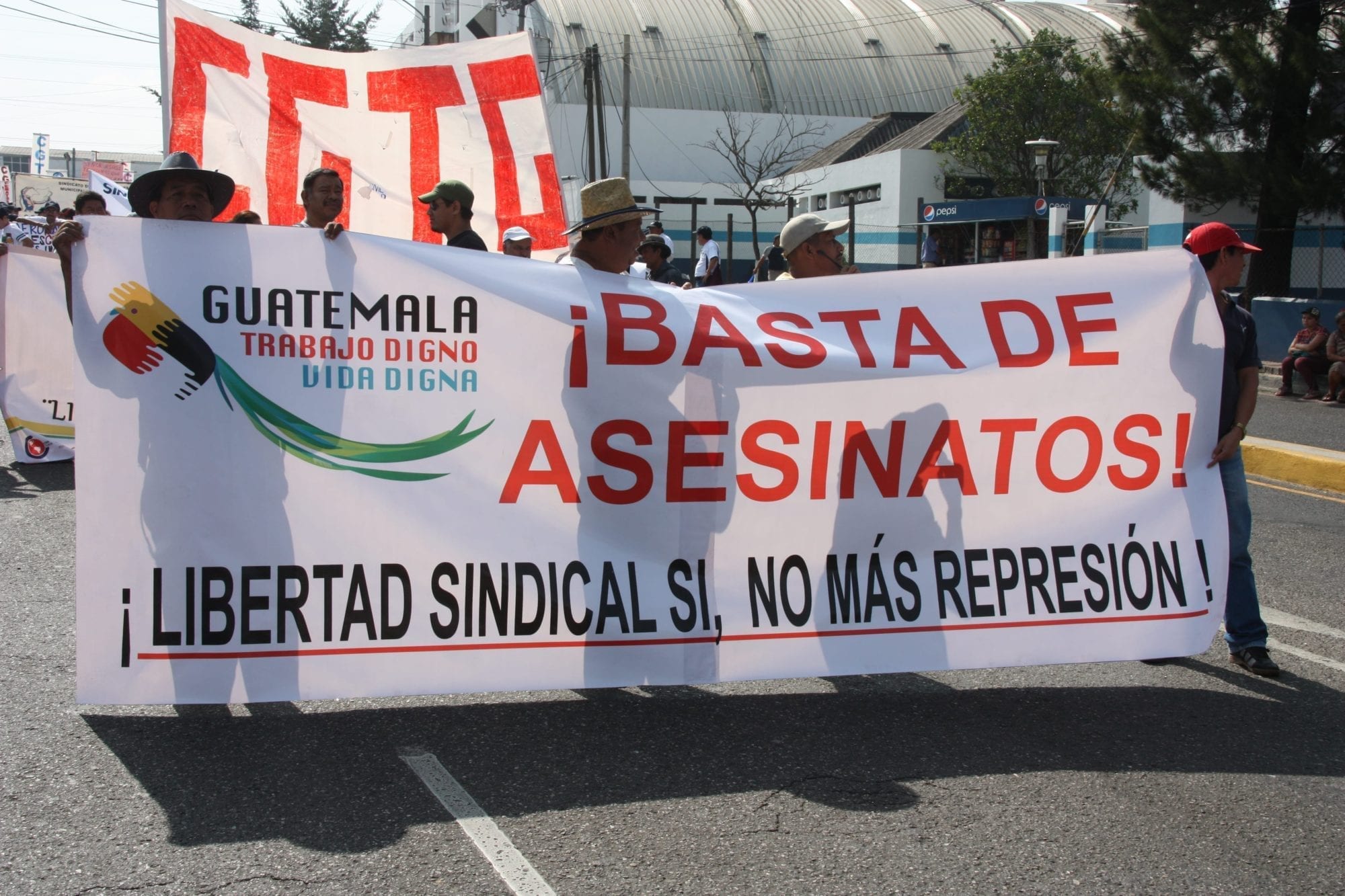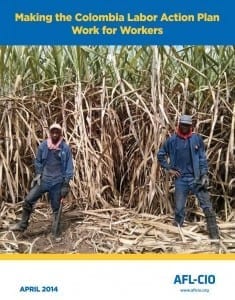
Apr 28, 2016
Guatemala is still one of the most dangerous places in the world for worker rights activists, with 14 incidents of anti-union violence documented and verified in 2015, according to a report issued today by the Worker Rights Defenders Network of Guatemala.
The incidents—including the October 2015 murder of Mynor Rolando Ramos Castillo, a municipal worker in southeastern Guatemala, and the sixth member of his union to be assassinated—were tracked by the Protection Unit of Human Rights Defenders-Guatemala (UDEFEGUA) and the Worker Rights Defenders Network in their ”Annual Report on Anti-Union Violence.” The group also documented the arbitrary and illegal detention of a trade unionist, anonymous death threats received by activists, and illegal firings and intimidation, including surveillance of the home of one trade unionist. Half of the cases involved public-sector workers.
Between 2004 and 2013, 70 trade unionists were assassinated in Guatemala, most with impunity. Only 18 cases from that period were investigated and successfully brought to trial. In November 2015, the Guatemala government reported to the International Labor Organization that the 52 other cases were still open.
The lack of credible police probes into harassment, threats and violence—including murder—against workers attempting to improve their working conditions, treatment and wages, and exercise their legal right to join a union has a dampening effect on workers’ voice. According to the report, when perpetrators of violence escape justice, human rights are denied and the right to freedom of association is co-opted, weakened, attacked and destroyed.
The Worker Rights Defenders Network of Guatemala was formed in 2014 to ensure observance and promotion of human rights in Guatemala. Its sister organization, the Network against Anti-Union Violence in Honduras, released its annual accounting of anti-union violence. Both organizations are Solidarity Center allies and received support to produce their reports.
Apr 8, 2014
 The governments of Colombia and the United States signed the Labor Action Plan (LAP) three years ago this week. The plan was intended to provide a road map for Colombia to protect internationally recognized labor rights, prevent violence against labor leaders and prosecute the perpetrators of such violence.
The governments of Colombia and the United States signed the Labor Action Plan (LAP) three years ago this week. The plan was intended to provide a road map for Colombia to protect internationally recognized labor rights, prevent violence against labor leaders and prosecute the perpetrators of such violence.
As a new AFL-CIO report shows, systemic violence against Colombian workers continues and workers still face persistent employer abuses. Palm workers like Miguel Conde of the union SINTRAINAGRO at the Bucarelia plantation initially were hopeful, but the LAP profoundly failed to deliver on its promises. In the blog, “Make the Colombia Labor Rights Action Plan Work for Workers,” the AFL-CIO Now writes:
“Like many Colombian workers, palm workers at Bucarelia were increasingly hired on as temporary subcontracts. Subcontracting prevents workers from forming unions, gets employers out of paying social security and other benefits due to direct hires and makes it easier to fire anyone who complains or supports unions., the LAP was supposed to end abusive subcontracting of those doing a company’s core work. When workers at Bucarelia learned about the promised reforms, and that the palm sector had been specifically identified in the LAP, they launched an organizing campaign, thinking they had a way forward.
Dec 4, 2012
Ten people were injured today after they were attacked by a mob of men wielding knives, sticks and rocks at the Tunisian Labor Federation (Union Générale Tunisienne du Travail UGTT) in the capital, Tunis.
As trade unionists held an overnight vigil to commemorate the 1952 assassination of Farhat Hached, UGTT founder and first general secretary, hundreds attacked the union’s offices, injuring participants, including two members of UGTT’s executive board. The attack was captured on amateur video.
“Today’s attack perpetrated against the UGTT is a second assassination of Farhat Hached,” said UGTT General Secretary Hassine Abassi, speaking on Shems FM, the UGTT radio station.
“The UGTT was never attacked like this during the time of (former presidents) Ben Ali or Bourguiba. We hold the current government responsible for this violence.”
Following the attacks, thousands of union members and supporters, including Solidarity Center staff, gathered in the city center and marched to Hached’s tomb to stand in solidarity with those injured and to denounce violence in a democratic society that respects values of equality and social justice.
UGTT’s offices were attacked in October, and union members and supporters rushed to barricade the doors. No one was injured. In June, the three regional UGTT office were damaged after being firebombed.
Hached was brutally murdered by a colonialist militia, a key event in Tunisia’s passage to independence.
The UGTT was recently honored by the AFL-CIO and received the George Meany-Lane Kirkland Human Rights Award for its fundamental role in supporting and sustaining the democratic uprising that took place in Tunisia in 2011.


